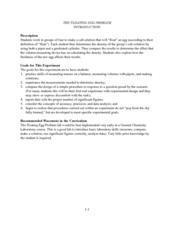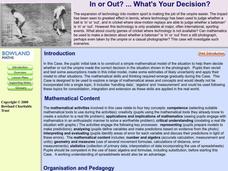Curated OER
The Floating Egg Problem
This is the grown-up version of the classic "float an egg in salt water" experience, plus an experiment in soap making. High schoolers explore density, but more importantly, practice accuracy, precision, and the use of significant...
Curated OER
Are Our Chemical Measurements Accurate or Precise?
What is the difference between accuracy and precision? This instructional activity has students define the terms accuracy and precision, and compare bulleye diagrams to find examples of both. Students analyze given data and determine the...
Curated OER
Precision and Accuracy in Measurement
In this Algebra I activity, students differentiate between precision and accuracy is measurement. The four page activity contains thirty-five problems. Answers are not included.
Curated OER
Measuring for Chemistry: Moles, Compounds, and Conversions
Through a station rotation activity, scientists complete 9 chemistry activities to complete this interactive learning exercise. Concepts include molar masses, percent composition, accuracy vs. precision, mass of an object, scientific...
Curated OER
Hydrogen Peroxide Analysis
A scenario is presented for chemistry techs to address. Using titration techniques, they must analyze hydrogen peroxide solution samples. They evaluate accuracy and precision in the process. They also gain experience consulting the MSDS...
Normal Community High School
Scientific Measurement
Pupils learn everything from how to take scientific measurements, to accuracy/precision, to density and a plethora of topics from a presentation on the metric system.
Illustrative Mathematics
Accuracy of Carbon 14 Dating I
Here is an activity that is intended to highlight a very important issue about precision in reporting and understanding statements in a realistic scientific context. Discuss different ways of reporting the half life of Carbon 14 using...
Illustrative Mathematics
The Lighthouse Problem
Long considered the symbol of safe harbor and steadfast waiting, the lighthouse gets a mathematical treatment. The straightforward question of distance to the horizon is carefully presented, followed by a look into the different...
Curated OER
Scientific Data: It's Not as Pretty as It Looks!
The difference between accuracy and precision is fundamental for high school science learners. Using test kits for nitrate concentration in water, they compare readings with each other. They consider the accuracy, precision, and bias of...
Institute of Electrical and Electronics Engineers
Robot Basketball
Hold a free-throw shooting challenge in your engineering class! Each team must design a contraption that will fire off a "robot arm" or, more specifically, a catapult, to send a Ping-Pong ball into a basket. Use this as an opportunity to...
Curated OER
Measurements and Their Uncertainty
In this measurements worksheet, students fill in 10 blanks, determine if statements are true or false, match 6 terms with the appropriate definitions, and solve 2 problems. Topics include converting to scientific notation, identifying...
National Nanotechnology Infrastructure Network
Is Measuring an Art or a Science?
Not only do future engineers learn the difference between accuracy and precision, they also get some hands-on experience using different measuring tools.
Curated OER
Significant What?
High schoolers define accuracy and precision, and differentiate between the two terms, apply the concepts of accuracy and precision to a given situation and correctly apply the concept of significant figures to measurement and...
Curated OER
What Can We Measure About Chemicals?
In this measurement worksheet, learners read about accuracy of measurements as compared to the precision of measurements. Students answer four precision problems and solve four accuracy problems.
Curated OER
What Can We Measure about Chemicals?
For this measuring chemicals worksheet, students determine the accuracy and precision of measurements and distinguish between the two. They find the percent composition of compounds, the molar mass of compounds and the volume of gases at...
Curated OER
Measure Twice
Learners measure a variety of objects using the appropriate measuring tool. In this measurement lesson, students explain the importance of accuracy and precision in collecting data. They discuss the difference between the two.
Santa Monica College
Introducing Measurements in the Laboratory
We use basic units of measurement to break down things and communicate clearly. The first lesson in an 11-part series teaches the proper way to measure various items. It starts simply with measuring the dimensions and areas of geometric...
Curated OER
Precise Diode Circuits
In this electrical circuit instructional activity, students construct a model of a diode circuit to demonstrate understanding. They analyze schematics and answer a series of 13 open-ended questions about diode circuits. This...
Curated OER
Gas Law Investigation
Investigators collect the carbon dioxide produced when an antacid tablet is activated and identify what alteration produced the most gas. They also collect the gas in a buret in order to practice precision. Then they choose between two...
Curated OER
Quinoa Pasta 3
A mixture of quinoa and corn is for dinner in this collaborative task that sets up nicely as a system of linear equations. Your supper guests discuss numerical precision and percentages as they formulate a plan of how to solve the problem.
Curated OER
The Little Prince: Socratic Questioning Strategy
Challenge readers to read closer in an activity based on the Socratic questioning strategy. As kids read Antoine de Saint Éxupery's The Little Prince, they use sentence starters to ask deeper questions about the text, and to relate what...
Illustrative Mathematics
Running Around a Track I
The accuracy required by the design and measurement of an Olympic running track will surprise track stars and couch potatoes alike. Given a short introduction, the class then scaffolds into a detailed analysis of the exact nature of the...
Curated OER
Math: Checking Scale Drawings for Accuracy
Students critique their own drawings for accuracy and make constructive suggestions prior to reworking them. They discover how scale in maps and drawing relate to relative size and distance. In addition, students comprehend the...
Bowland
In or Out? ... What's Your Decision?
Young mathematicians use photos and video clips to determine if a cricket player is "in" or "out." This analysis occurs using scale factors, distance-rate-time formula, and consideration of precision and accuracy.

























